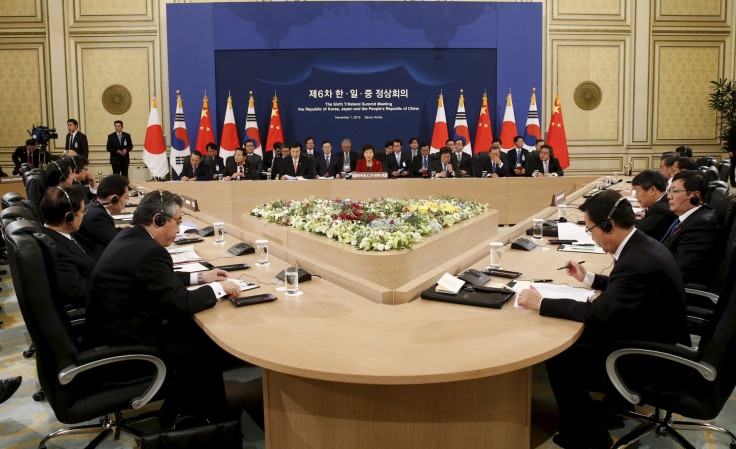Chinese, Japanese And South Korean Leaders Meet To Mend Strained Relations Over Trade And Territory

Chinese Premier Li Keqiang, Japanese Prime Minister Shinzo Abe and South Korean President Park Geun-hye met Sunday, for the first time in over three years, in an attempt to resolve longstanding territorial disputes and boost trade ties. The tripartite talks -- the first such meeting since May 2012 -- are being held in the South Korean capital of Seoul.
“The goal of the three-party meeting is to boost communications between the three nations and to maintain stability in the region,” China’s Deputy Foreign Minister Liu Zhenmin reportedly said, at a briefing in Beijing ahead of the talks.
The trilateral meeting used to be a regular annual event between 2008 and 2012. However, territorial disputes between the three Asian nations, and lingering animosity over Japan’s role in World War II, eventually halted the process.
South Korean and Chinese ties with Japan have been affected by what the two countries perceive as a repeated failure by leaders in Tokyo to properly atone for wartime atrocities. Meanwhile, Japan and China have also been at loggerheads over territorial claims related to a clump of uninhabited islands in the East China Sea -- called the Senkakus in Japan and the Diaoyu in China. Additionally, Japan has also raised concerns over restrictions in navigation in the South China Sea, as the country relies on the waters to transport oil from the Middle East.
In recent months, relations between the three nations have eased as they have sought to focus on shared security and trade concerns. According to reports, the growing threat posed by North Korea’s nuclear ambitions and the revival of a long-stalled trilateral free-trade agreement are likely to be key issues discussed during the meeting.
While China and South Korea currently enjoy strong trade ties, the two nations are not part of the Trans-Pacific Partnership -- a major trade agreement between 12 Pacific Rim countries, including Japan. Given China’s recent economic slowdown, exclusion from a significant part of regional trade is likely to worry both China and South Korea -- which counts China as its largest trading partner.
“We hope to accelerate the [free-trade talks],” Liu reportedly said. “We have full confidence in the cooperation with Japan and Korea and East Asia at large. We will have to learn the successful experiences of the EU and North America.”
However, no significant breakthroughs are expected in Sunday’s talks.
“The most important thing is that this meeting is happening at all,” Andrew Small, a China expert at the German Marshall Fund of the United States, reportedly said. “South Korean-China relations have been very good under President Park, but security tensions between China and Japan, and political tensions between Japan and South Korea, have been acute in recent years. The resumption of these trilateral meetings is hence a reflection of the fact that all three sides are now making efforts to at least mitigate them.”
© Copyright IBTimes 2025. All rights reserved.






















